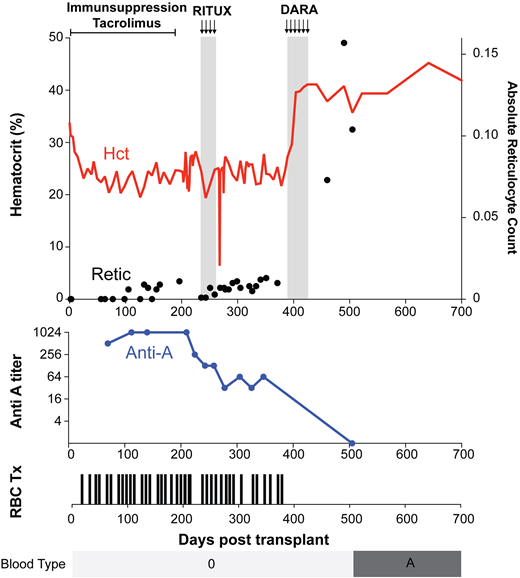Abstract
Allogeneic stem cell transplantation represents a curative treatment option for patients with malignant hematologic diseases, including myelodysplastic syndrome (MDS). In 25-50% of transplants, HLA-matched allogeneic stem cell donors have some degree of ABO incompatibility with the recipient. Major ABO incompatibility is caused by recipient antibodies directed against donor red blood cells (RBCs) and may lead to delayed RBC recovery and transient pure red cell aplasia (PRCA). We describe a case of treatment-refractory pure red cell aplasia following a major ABO-mismatchedallogeneic stem cell transplant successfully treated with daratumumab.
The 72-year-old patient with MDS received a matched unrelated donor transplant with a major ABO incompatibility, recipient blood group O from blood group A donor. Despite prompt engraftment with WBC and platelet recovery he remained anemic and RBC transfusion dependent. Bone marrow biopsy showed <1% erythroid elements concerning for post-transplant PRCA. 200 days post-transplant he had persistent circulating anti-A antibodies and no signs of red cell recovery. Standard treatments including tapering of immunosuppression, steroids, rituximab and erythropoiesis stimulating agents had no effect. The patient remained transfusion dependent with 1-2 units per week. Following treatment with daratumumab 390 days post transplant, he achieved transfusion-independence promptly within one week of treatment with daratumumab and continues to have normal erythropoiesis 10 months after daratumumab treatment. Anti-A antibodies became undetectable. The patient tolerated daratumumab well and no signs of GVHD or opportunistic infections were observed.
We describe the use of daratumumab in patients with PRCA after major ABO mismatch allogeneic stem cell transplant. We hypothesized that a selective treatment targeting the CD38 positive plasma cells would decrease anti-A antibody production and allow for RBC recovery. Our findings suggest that direct targeting of residual host plasma cells with an anti-CD38 targeted agent such as daratumumab might be a valid treatment option that needs to be considered for patients refractory to standard treatments.
No relevant conflicts of interest to declare.
Author notes
Asterisk with author names denotes non-ASH members.


This feature is available to Subscribers Only
Sign In or Create an Account Close Modal